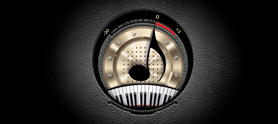 |
 |
 |
News & Info
A Word About Our Delivery
by Bill Schnee - December 2010
In the last 30 years there has been a huge decline in the quality of sound reproduction to the consumer - from the LP - to the overly compressed CD - to the overly compressed Mp3. Meanwhile professionals have continued to pursue making better sounding recordings in the studio. Why is there this disparity? Two big reasons…
1. Competition for high level.
In the 60s and 70s, everyone wanted their records as hot as possible. Record promotion people wanted a ‘hot’ single to take to radio stations so it would jump out of the speakers. And no artist or producer wanted their album or single to be quieter when it dropped on the turntable of a record changer or juke box after another artist’s music had just played. But the limitations of the vinyl medium only allowed level to be pushed so far. As the CD took over as the primary delivery medium for music at the end of the 80s, artists and producers began pushing mastering engineers for more and more level on them as well. A big reason for this was the primary listening environment for music had shifted to the automobile, with it’s increased background noise. By using extensive brick wall limiting and digital compression, levels far above the LP could be obtained, but at a great cost to the dynamics and fidelity of the original mix (as in added distortions). What this extra limiting does is make for a much higher average level, but with much less peak factor. It’s higher peak levels that make your speakers ‘jump’ on transients, as opposed to the average level that just makes the music constantly louder. It’s sad that with the compact disc’s great dynamic range of over 90 db, most CDs today are using only 5-10% of it by pushing these high levels. In addition, the D to A converters in many CD players and computers cannot handle this increased level, causing even more distortion. The overly compressed CDs are then turned into overly compressed Mp3s, which have now become the new standard for music.
2. Convenience.
The compact disc won the battle over the LP because of convenience, and the Mp3 is even more convenient. Mp3s and portable players have put music in more people’s ears than ever before in history. But this portability has reduced music to something you listen to while doing something else … exercising, cooking, bike riding, etc. People don’t sit and listen to complete albums the way they did in the LP days. We at Bravura would love for each artist’s efforts to be listened to from top to bottom - at least the first time. And while Mp3s are wonderful technology for convenience, they certainly do not begin to sonically convey what those in the studio work so hard to achieve. Of course to even begin to hear what is heard in the studio, one has to listen on something more than earbuds, an Mp3 docking station, or even computer speakers.
The bottom line:
Today, most music is not being listened to in a quiet room like the control rooms where it’s mixed and mastered. Done in part to combat the noisy environment of the car, the sound of the overly compressed CD has caused lots of serious music listeners to stop listening to music. Our desire is for the serious music lover to regain the enjoyment of listening to new music. As a result, most Bravura records will have had a minimum of limiting or compression used in the recording, and positively NO digital limiting - even on the CD versions. As a result, our CD releases may be as much as 6 db lower than the average commercial CD. You will just have to use your volume control for it’s intended use! But, you will get ALL the dynamics as the musicians played them in the studio.
|
 |
Posts

Choosing A
Distribution Format
A Word About
Our Delivery
A New Venture
Terms & Conditions
|
 |

